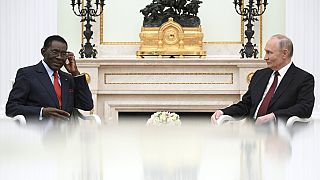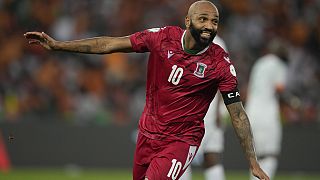Equatorial Guinea
Equatorial Guinea’s paramount court on Monday confirmed the dissolution of the country’s main opposition and upheld 30-year jail terms handed to 21 of its members.
The Citizens for Innovation (CI) party had been dissolved by a court in Mongomo on February 26.
It also sentenced 21 activists, including the party’s only MP, Jesus Mitogo, to 30 years in jail for “sedition, public disorder, attacks on authority and serious bodily harm.”
“In the name of the head of the state, we reject the appeal,” the president of the Supreme Court, Juan Carlos Ondo Angue, announced.
A former Spanish colony of 1.2 million people, awash with oil but mired in poverty and a reputation for corruption, Equatorial Guinea has been ruled with an iron fist by Teodoro Obiang Nguema since 1979.
In elections last November, the CI won the only parliamentary seat not taken by President Teodoro Obiang Nguema’s Democratic Party of Equatorial Guinea (PDGE), which claimed 99 of 100 seats.
Why opposition was banned in Equatorial Guinea
The trial in Mongomo was linked to scuffles that occurred a week before the vote, when police tried to stop a CI rally in Aconibe, hometown of party leader Gabriel Nse Obiang Obono.
Three police officers were hurt and their weapons, three AK-47 assault rifles and a pistol, were seized, according to court documents.
After the elections, an attempted coup took place on December 24, a plot that the authorities said was planned internally and carried by foreign agents.
A wave of arrests followed, with detainees saying they were lashed 100 or 150 times each night. A CI member, Santiago Ebee Ela, 41, died in custody, the party said.
Opposition reacts to court ruling
Reacting to Monday’s court decision, CI lawyer Fabian Nsue Nguema described the appeal outcome as “a sentence for dictatorship and shame.”
“The Supreme Court received instructions from the president of the republic to dissolve the CI,” he told AFP.
Carmelo Ngomo Abeso, the CI’s first vice secretary-general, said, “there is no law in this country.
“No-one on the (Supreme) Court is able to contradict President Teodoro Obiang’s demand, which was clearly to ask the judiciary to put an end to the CI.”
Obiang seized power by ousting his own uncle, first post-independence president Francisco Macias Nguema, who was shot by firing squad.
During his decades in office, Obiang has since seen off at least half a dozen assassination or coup attempts. He won a fifth seven-year term in 2016 with nearly 94 percent of votes.
AFP













Go to video
"Enough Is Enough": Liberians protest for justice, jobs, and accountability
01:04
Turkish democracy under pressure: Erdogan's top rival sentenced to two years in prison.
02:23
Cameroon: Mixed reactions in Yaoundé after Biya announces bid for another term
Go to video
Togo protest crackdown raises fears of worsening political crisis
Go to video
Tunisia sentences prominent opposition leader to 14 years in prison
01:01
Chad’s former Prime Minister appeals to Macron after two months in detention